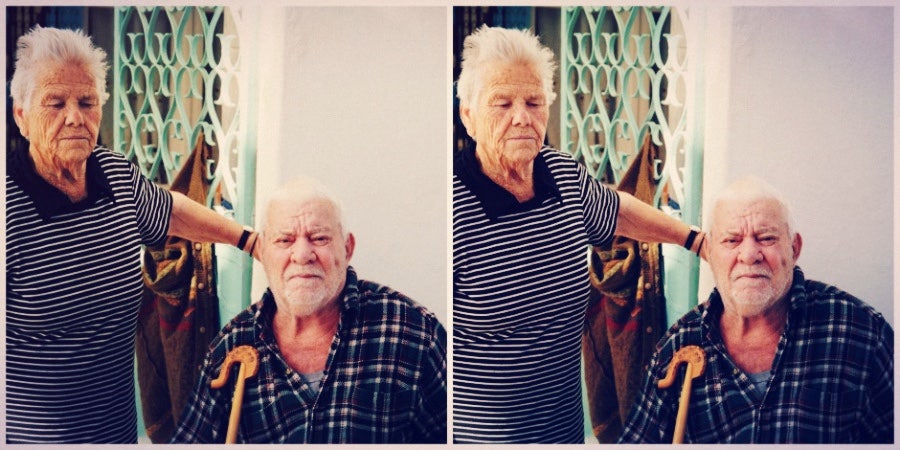5 Ways To Help Protect & Prepare Older Family Members During A Coronavirus Quarantine
Older adults are said to be more susceptible to the virus.
 Thomas Summer via Unsplash
Thomas Summer via Unsplash By Jillian Mock
You’ve bought canned goods. You’ve stocked up on soap. You and your kids are washing your hands for 20 seconds and singing happy birthday on repeat.
If COVID-19 is coming, your household is ready.
But there is one more thing you need to think about: How to keep the grandparents safe.
Based on what we know about this virus so far, COVID-19, or coronavirus, is particularly dangerous for older adults and people with underlying health conditions, although officials say there isn’t enough information to say exactly which underlying health conditions put patients more at risk.
From China to the United States, this trend seems to be holding true. Because of this, the CDC has recommended that all persons over 60 have their pantries filled and be ready for a long stay at home with minimal contact with the outside world.
Part of this should be an easy sell. What person of a certain age doesn’t like being prepared and having a full pantry and fridge, just in case? But minimal contact is much more sticky, especially for grandparents.
Anyone who gets to see their grandkids on the regular is likely going to balk at a quarantine from the kids. This is why parents need to start having the talk with the grandparents now and start making out a game plan for when (“if” for the optimists) the coronavirus hits your community.
Here are five tips for having the talk — without having grandma and grandpa feel isolated and alienated.
1. Be the adult.
It could be weird or difficult to be the one to tell your parents that they need to limit their interactions with you and the rest of the outside world for their own safety. As your parents continue to age, however, you may have to have these kinds of difficult conversations more than you would like.
This could be a way to practice. Approach the topic gently and try not to get frustrated if your parents don’t immediately agree to go into quarantine right away.
You may have to convince them and have the conversation a few times. And make sure it is always clear that you are trying to be as respectful of them as possible all the way.
2. Talk, but also listen.
Just telling your parents to go ahead and quarantine themselves probably won’t go over well.
Instead, try to make it a conversation where together you decide how this is going to work, at what point they should isolate themselves or consider coming out of isolation, what your major concerns are, and how you will communicate during an outbreak in your community.
3. Use — and be patient with — video chat.
In these uncertain times, video chat is an obvious solution to helping your parents stay connected. And there are tons of options — Skype, FaceTime, Google Duo Video — so you can make it work no matter what your parents have going on digitally.
Kids can be terrors when it comes to video chats, however, especially if they aren’t used to it. You may want to chat with your parents ahead of the time that the video thing will take some getting used to, and your kids might be weird talking with them through it at first.
Instituting a standing appointment at the same time every day or week of the self-imposed quarantine, however, could help normalize the video screen for your kids and enhance the virtual interactions they have with their grandparents.
Video chatting can also help you keep a closer eye on your parents and their health. It’s easier to know how someone is really doing when you can actually see them. And if something looks or seems amiss, you can quickly spring into action.
4. Sign them up for TikTok.
The internet provides all kinds of ways for people to stay connected and strengthen their bonds without being face-to-face. Online games (thinking more Words with Friends than Call of Duty) can allow grandparents to play with their grandkids from afar.
If they’re up for it, they could even get creative with video editing apps and start swapping silly TikToks or other short videos with their grandkids. It may not be as good as face-to-face time, but being forced to get creative could bring a fun and fresh new dynamic to the grandparent-grandchild relationship.
5. Keep up your rituals.
Maybe you normally get lunch with the grandparents every Sunday, or Saturday afternoon is the time that your parents normally take the kids and give you and your partner a much-needed break.
Quarantining the grandparents will, of course, rupture this normal rhythm and may heighten their sense of isolation. Even though you can’t connect in the same way that you normally do, try to keep that ritualistic appointment.
Sharing a meal together via phone or video chat can’t replace what you normally do, but it is better than missing each other.
Jilliam Mock is a writer who focuses on parenting, family, and health and wellness. For more of her family content, visit her author profile on Fatherly.

